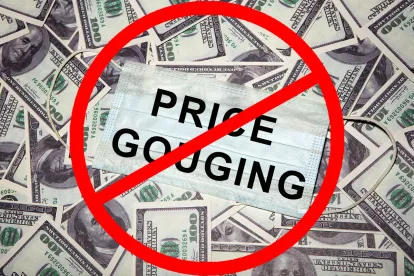Price gouging enforcement and litigation is front and center for company counsel and business managers nationwide. Our weekly round up highlights some of the most relevant news and information for our clients and friends. Minnesota Legislature Introduces Pricing Gouging Legislation
Minnesota Legislature Introduces Pricing Gouging Legislation
Minnesota is currently among the minority of states without a formal price gouging law. However, on March 20, 2020, Minnesota Governor Tim Walz prohibited price gouging during the state of emergency via Executive Order 20-10. Now, on February 10, 2021, the Minnesota state legislature introduced a bill that would provide “[d]uring an abnormal market disruption a person is prohibited from selling or offering to sell an essential consumer good or service for an amount that represents an unconscionably excessive price.” An unconscionably excessive price is defined in the legislation to mean “1) the amount charged represents a gross disparity between the price of the good or service and (i) the price the same good or service is sold or offered for sale in the usual course of business immediately prior to the onset of the abnormal market disruption, or (ii) the price the same or similar good or service is readily obtainable by other purchasers in the trade area; and (2) the disparity (i) is not substantially attributable to significant additional costs outside of the seller's control, and (ii) does not increase the seller's profit.” The bill would also enforce a civil penalty of not more than $10,000 per sale or transaction per individual for violations.
Reports of Excessively Priced COVID-19 Tests in Texas
In Texas, approximately 200 freestanding emergency rooms – emergency rooms not attached to a hospital – are running COVID-19 testing sites throughout the state. While these centers operate in many ways like other COVID-19 testing centers, patients are reporting bills ranging from $1,000 to $12,000 for receiving a test. One Austin, Texas resident reported a bill for $2,000, while others have reported bills as high as $12,000. However, according to Blake Hutson, associate state director for AARP Texas, while “this whole thing really looks and feels like price gouging . . . by law, it might not be.” Under state law, Hutson said that “freestanding ERs are allowed to bill up to 200% of the average charge for a service.” Complaints of excessively priced COVID-19 tests are part of the larger debate surrounding rising health care costs. For more information on pricing and reimbursement of COVID-19 tests, read our blog post.
Missouri Attorney General Announces 2020’s Top 10 Consumer Complaints
On February 9, 2021, Missouri Attorney General Eric Schmitt revealed that his office received 116,684 consumer complaints in 2020. Among those, 1,326 complaints related to price gouging. Attorney General Schmitt stated that “this is the first time price gouging has made the top 10 list. Most of the complaints alleged price gouging during the initial stages of the pandemic.” Many of these complaints, Attorney General Schmitt stated, related to face masks, gloves, toiletries, and food. Missouri’s price gouging law states that “[i]t is an unfair practice for any person in connection with the advertisement or sale of merchandise to . . . charge within a disaster area an excessive price for any necessity . . . or charge any person an excessive price for any necessity which the seller has reason to know is likely to be provided to consumers within a disaster area.” Mo. Code Regs. tit. 15, §60-8.030.
North Carolina Attorney General Announces 2020’s Top 10 Consumer Complaints
North Carolina Attorney General Josh Stein recently announced North Carolina’s top 10 consumer complaints of 2020. Coming in at number two with 2,336 complaints were those related to price gouging. North Carolina’s price gouging law, which applies to all parties in the chain of distribution, provides that it is unlawful for a “ person to sell or rent or offer to sell or rent any goods or services which are consumed or used as a direct result of an emergency or which are consumed or used to preserve, protect, or sustain life, health, safety, or economic well-being of persons or their property with the knowledge and intent to charge a price that is unreasonably excessive under the circumstances.” N.C. Gen. Stat. §75-38(a).




 />i
/>i

